They say if you stare at your Gun.io invoice long enough, you start to see visions: a dev team made of unicorns, handpicked from Silicon Valley, all speaking perfect English and working U.S. hours. But then reality swipes left—you’re still chasing down support emails, the “relationship-first” vibe feels more like relationship status: it’s complicated, and you’re starting to wonder what’s really under the hood.
Maybe you signed up for the boutique experience and got boutique hiccups—slower matching than you hoped, a talent pool that feels a little too Nashville, or premium pricing that feels less “worth it” and more “are we the suckers here?”
Turns out, you’re not alone. The tech hiring world in 2025 is flooded with platforms selling trust, quality, and convenience—some deliver, some ghost you when you need them most. The good news: you have options, and switching doesn’t require any more awkward breakups.
Ready for the unfiltered, unsponsored look at Gun.io and the platforms giving it a run for its money? Let’s get you past the marketing and into the real alternatives.
Why Teams Are Swiping Left on Gun.io in 2025
Remember when hiring through Gun.io felt like skipping the line at a secret club? For a while, the pitch had teeth: curated talent, smooth-talking reps, and the promise of “relationship-first” service that made Upwork look like Craigslist’s unkempt cousin.
But by 2025, two things happened: prices kept climbing, and so did expectations. Suddenly, that “U.S.-vetted premium” starts to feel a lot more premium than vetted. The pool? Still heavy on Americans, still light on variety, still slow if you need more than one good dev this month. Add in mixed reviews about project flow, a few transparency black holes, and enough overhead to make your CFO sweat, and you’re left wondering—is this really better than rolling your own?
Gun.io isn’t a lost cause. If you want U.S.-centric talent, don’t mind the bill, and crave something boutique, it’s still a player. But if your priorities are speed, selection, value, or a platform that doesn’t mind getting its hands dirty, you’re probably already eyeing the exits.
The Top Gun.io Alternatives for 2025 (And Why Lemon.io Belongs at #1)
Not all “alternatives” are created equal—some fix Gun.io’s quirks, some just swap them for new ones. If you want to ditch the nonsense and get things done, these are the hiring platforms that deserve your shortlist.
1. Lemon.io (Best Overall: Ruthless Vetting, Startup-Focused, Actually Human Service)
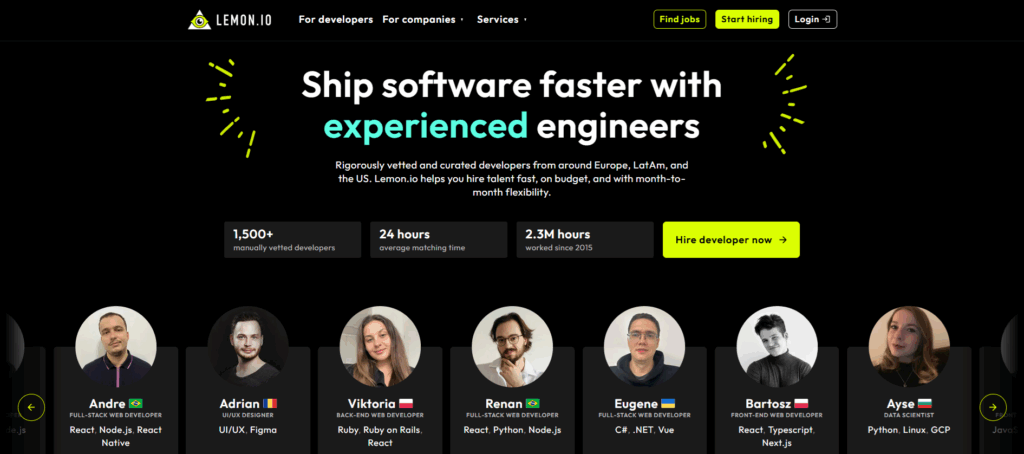
Lemon.io is the developer matchmaking service that doesn’t play coy about its standards—or its loyalties. Our claim to fame? A “98% rejection rate” that’s become a rallying cry for startups who’ve wasted enough time rolling the dice on platforms peddling warm bodies. If you make it through Lemon’s vetting, you’re not just another coder—you’re a builder with battle scars, communication chops, and a taste for fast-moving teams.
Our platform skips algorithmic roulette in favor of real technical interviews, background checks, and conversations with humans who know the difference between a good answer and a canned one. Most clients meet qualified candidates in two weeks (sometimes a few days), with no deposits, no monthly “membership,” and no fine print buried in your invoice. Pricing is as transparent as it gets, and the bulk of Lemon.io’s devs hail from Eastern Europe—so you get quality without Silicon Valley sticker shock.
What do real customers say? Teams highlight quick turnarounds after struggling elsewhere, and more than a few call out Lemon.io’s support and flexible approach when the “perfect fit” wasn’t immediately available. Long-time clients say the platform keeps improving, praise the quality of developers, and point out that Lemon.io listens to user feedback (a rare feat in this space).

It’s not all sunshine: if your stack is extra-niche or your budget is “let’s pay in exposure,” you’ll get a polite but firm no, not a time-waster. The selectivity and tell-it-like-it-is mindset are exactly what keep happy clients coming back—for everyone else, the boundaries are clear. When Lemon.io works, it works fast; when it doesn’t, you’ll get a straight answer, not the runaround.
2. Toptal (Best for Enterprises and Fortune 500 Credibility)
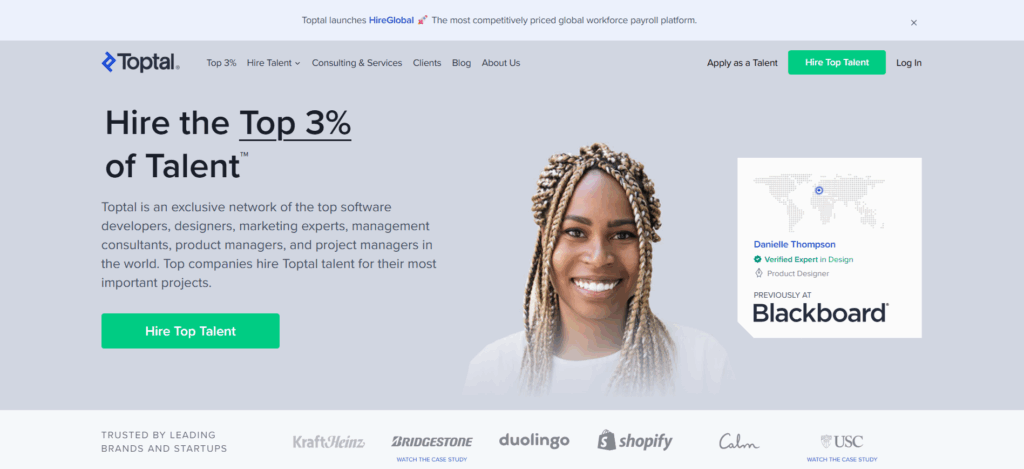
Toptal is what happens when you cross old-school “top 3%” marketing with modern, process-obsessed project management. You’ll pay for the polish—Toptal’s rates are among the highest in the industry—but for teams who need the kind of paperwork, handholding, and NDA-checking that soothes a legal department, it delivers. This is where Fortune 500s and funded startups go when “fast” needs to also mean “safe.”
Real users give Toptal plenty of credit for finding standout talent, especially for trickier product and design roles. One founder highlights their collaboration with a Figma pro: “I’m not a technical founder, so having his calm and steady guidance on what users want and how to engage was priceless.”

Another review notes a “project delivered above expectations”—but also flags a different pain: surprise invoice hours and unclear supervision, adding “serious concerns with the accounted hours on invoices and supposed supervision from Toptal. Severe conflicts of interest may exist within the business model.”

With Toptal, you’re buying a process and a brand, not just a dev. The velvet rope keeps out the riffraff, but it doesn’t always guarantee perfect oversight. If you want to spend big and have your org look Fortune-500-official, it absolutely delivers. Just keep an eye on your invoices—and don’t assume anyone’s watching the hours as closely as you are.
3. Arc.dev (Best for Fast Matches and Remote-First Teams)
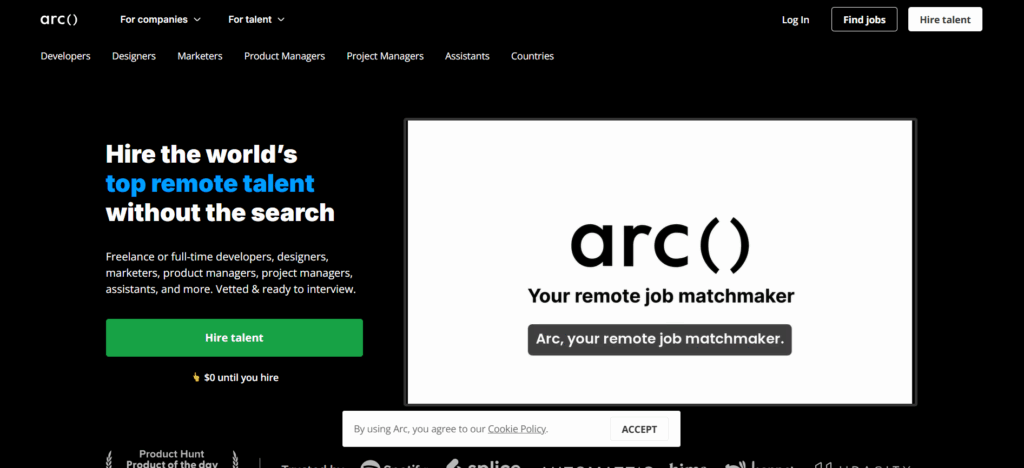
Arc.dev promises speedy, low-hassle matches powered by algorithms that don’t need weeks to ponder your job post. The network is global, the vetting process is part-human (not just bots), and founders running late on a launch tend to love the turnaround—matches often land in your inbox in two or three days.
Arc.dev is for teams who want fast, truly global access and don’t mind a little algorithmic matchmaking along the way. Users regularly highlight Arc’s strong developer pool and a platform that feels built for scaling up—one reviewer praised the platform’s “vast network of top-tier developers” and the “personalized approach to matching” for both technical and culture fit. The site is loaded with high marks for responsive, polite support: “The service provided by Neo Edison was more than excellent…polite and very patient…able to answer all our questions and find the best deal for us.”

That user-friendly interface and prompt support can make hiring feel almost too slick—but there are caveats. Pricing is a sticking point (“the cost factor might deter some businesses from fully leveraging the platform’s capabilities”), and more than a few reviews come from freelancers working through Arc—not always from the hiring side. Expect speed and a broad bench, but plan to vet your options closely if you want surface-level support to translate into real accountability.
4. Upwork (Best for Control Freaks, Hustlers, and Budget Shoppers)
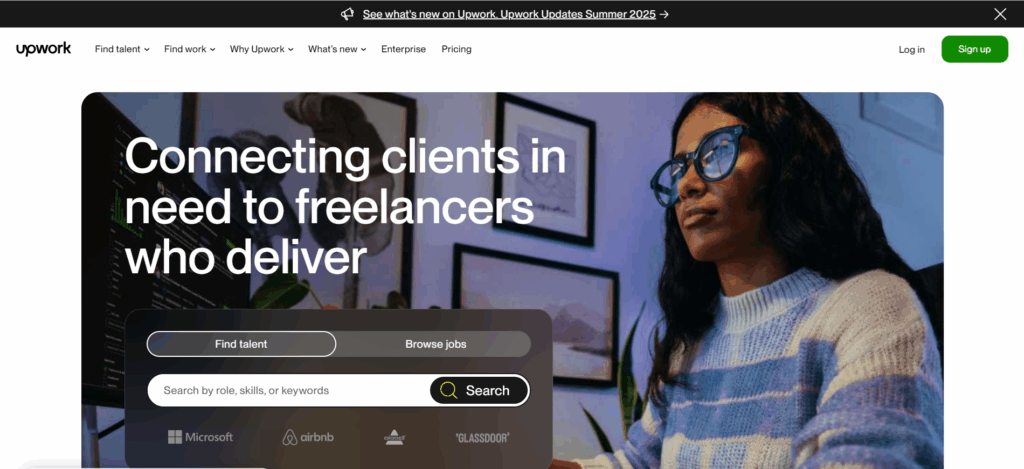
Upwork is still the world’s biggest, loudest developer bazaar: you get absolute control and nearly unlimited choice, but “buyer beware” is the real house rule. One long-term client says the escrow and milestone payment system “works well” to keep projects on track, and finding both general and niche talent is as simple as spinning the search filters. High spenders praise Upwork as a place where, if you set projects up right and stay vigilant, you’ll get the work done.
But those wins come with headaches. Plenty of buyers have been blindsided by sudden, unexplained account holds—even after spending thousands or running critical projects. Reviews pile up describing accounts frozen with no warning, no real explanation, and a customer service team that either ghosts you or sends you in endless circles. If you need support or a quick fix when something breaks, don’t hold your breath—many users find themselves locked out with deadlines looming and no one picking up the phone.

The bottom line: Upwork will give you access, scale, and payment security (when it works). But you’ll need the stamina for bureaucracy, and you can’t count on customer support when things go sideways. Use it if you like being fully in control and want to swim in a sea of talent—but keep your receipts and your fallback plan ready.
5. Andela (Best for Large Scale, Big Budgets, and “Global Talent, Global Process” Vibes)
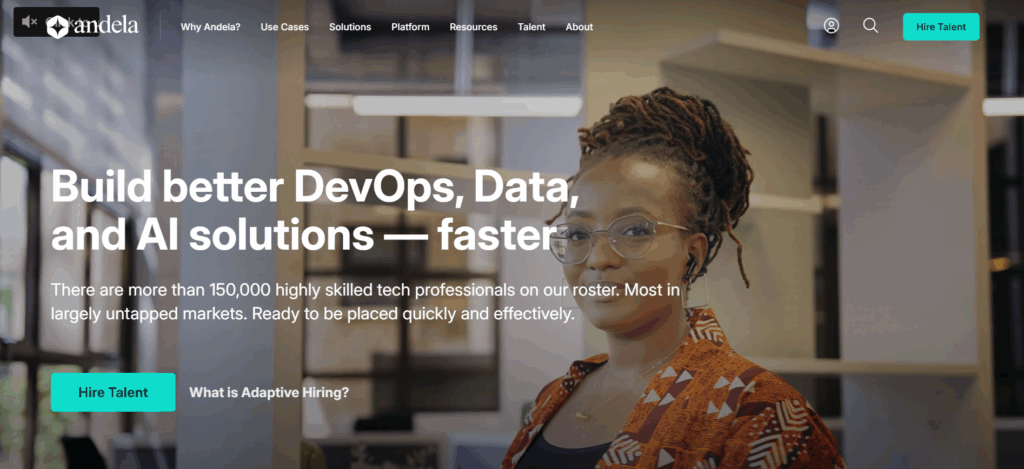
Andela sells itself as the answer to big-company hiring headaches: massive talent pool, worldwide reach, and “AI-powered” matching that promises you’ll meet your next dev in less time than it takes finance to approve the PO. The process is buttoned-up, the branding is enterprise. If your org likes contracts, compliance, and knows what to do with a 12-month commitment, this is your buffet.
Many teams praise Andela as one of the best hiring moves they’ve made, noting diligent developers who adjust for time zones and consistently deliver solid work. Managers call out the platform’s thorough onboarding and account support—one review highlights the “quick follow-up” from the Andela team and regular, well-run check-ins to keep efforts on track.

Clients repeatedly mention the combination of deep expertise, flexibility, and a growth mindset from developers, along with professional, approachable account managers who are responsive and genuinely solution-oriented. When the fit is right, Andela is seen as a rock-solid partner for integration, support, and large-scale projects.
Negative notes? They’re tough to find in public reviews—most praise is effusive, with very little criticism or caveat. Still, as always, it’s smart to trial and check beyond the glossy reviews to make sure the match sticks after the kickoff call.
6. Turing (For AI Matching at Scale and “Silicon Valley Style” Hires)
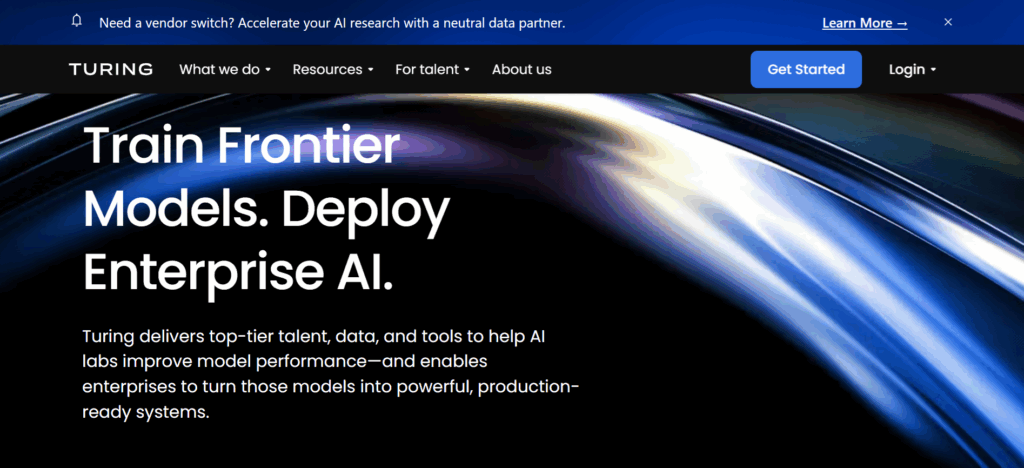
Turing promises Silicon Valley talent on demand, with an AI-driven process that should speed up sourcing and matching. Some clients report positive outcomes—a reviewer notes, “They found me a frontend developer from India, he works in my team for 2 months,” though slow and inconsistent communication is a recurring complaint. Others praise the quality when they land a winner: “I met this developer who blew me away… timely on projects and gives your project priority. I wish I had another project to give him.”

But the noise around Turing is loud and deeply mixed—there are a huge number of one-star reviews, especially from frustrated freelancers. Many claim Turing takes more than half the client’s payment (out of a $14,000 contract, $6,000 goes to the developer), with complaints about the quality of projects, payment issues, or jobs that never materialize. Some go further, warning that the whole system is just a data collection operation for resumes and test results—though this is speculation and hasn’t been proven.
The upshot: Turing absolutely has real, happy clients and talented devs on its roster, but it’s a “your mileage may vary” experience. Expect to do your own vetting and follow-up, and be cautious about assuming you’ll always get what’s pitched on the tin.
What Is Gun.io? How the “Boutique” Platform Built Its Niche
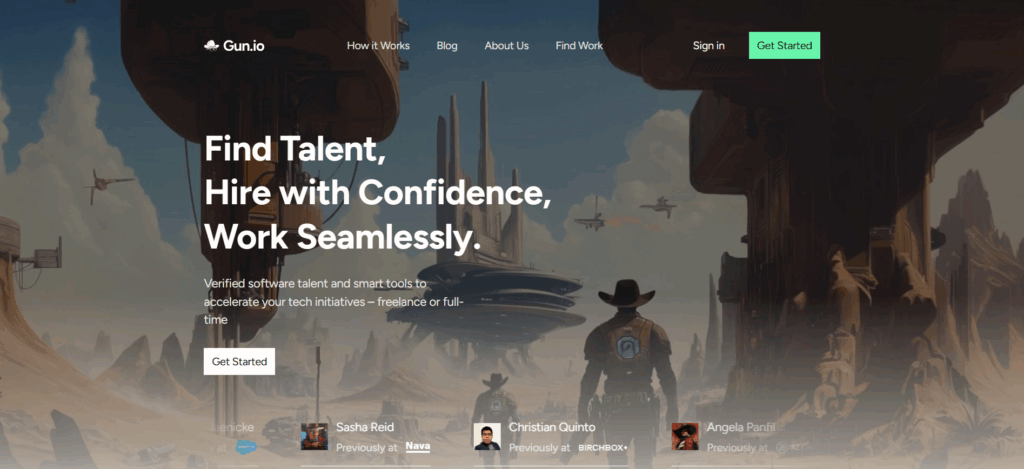
Gun.io didn’t start out as another faceless SaaS hire-a-dev machine. The platform was founded in 2013 by a couple of developers frustrated by the chaos of the freelance wild west—think missed deadlines, mystery skills, and communication breakdowns that’d make a recruiter cry.
Instead of chasing unicorns with resumes full of fluff, Gun.io set out to be the matchmaker for grownups: only work with proven, U.S.-centric engineers who’d already built real things, knew their way around a client call, and could pass the “would you hire this person again?” test.
Fast-forward to today, and Gun.io is still leaning into its “relationship-first” DNA. The pitch: forget armies of anonymous freelancers—what you get is a boutique pool of senior devs who can hit the ground running, a dedicated team of advocates who’ve been there, and matching done by humans, not just algorithms.
It’s designed for companies who want to skip the spam and cut straight to “let’s get started.” But as you’ll see, scaling that boutique feel comes with a few growing pains of its own.
Inside Gun.io’s Vetting Process: The Good, the Quirky, and the Gaps
Gun.io’s claim to fame is a vetting process that tries to go deeper than “can you fizzbuzz under pressure?” First comes a heavy screen—English fluency, strong experience, solid technical footprint—followed by an invitation to their private Slack community. If you make the cut, you’re thrown into real project teams where your code doesn’t just get read; it gets reviewed by peers, scored, and scrutinized. The goal? Find out who thrives in the wild, not just who checks boxes in a quiz.
Fans praise this project-based approach for surfacing developers who aren’t just good on paper—they deliver in a real Slack thread, not just a single interview. Some say it’s the only platform where “the devs didn’t have to Google how to be professional.”
But the process isn’t flawless: developers complain about waiting weeks for a go/no-go, feedback can be a black hole, and clients sometimes notice uneven quality or U.S.-centric tunnel vision. For all its rigor, Gun.io’s “relationship-first” ethos means you get real humans at every step—sometimes that’s magic, sometimes it comes with lag, subjectivity, or a slow yes.
Bottom line: Gun.io’s vetting is more personal and practical than most, and when it works, it delivers the goods. Just know that “boutique” is code for a smaller pool, and patience helps if you’re hoping for the perfect match on a deadline.
Comparing the Alternatives: How the Top Platforms Stack Up
So how does Gun.io, with all its boutique quirks, really measure against the rest of the 2025 field? Here’s a grid you wish every sales rep would just hand over: who’s got the biggest pool, who answers when you email, and where your budget is most likely to evaporate.
Platform |
Vetting Depth |
Geography |
Pricing |
Support Vibe |
Standout Feature |
Watch-Outs |
|---|---|---|---|---|---|---|
Lemon.io |
Human, ruthless, real |
Eastern Europe |
$45–$120/hr |
Responsive, direct |
98% rejection rate |
Niche stacks take longer, no “cheap” |
Toptal |
Process-heavy, elite |
Global |
$80–$200/hr |
Enterprise, formal |
“Top 3%” & velvet rope |
Pricey, hit-or-miss on hand-holding |
Arc.dev |
Hybrid AI + people |
Global |
$60–$100+/hr |
Light touch |
Fast matches, flexible contracts |
“Good enough” not always “great” |
Andela |
AI-matching + scale |
Global |
$6k–$15k/mo |
Corporate, slow |
Massive pool, compliance |
Pricey, contracts, variable support |
Turing |
AI/ML-driven, volume |
Global |
Varies |
Self-serve/light |
Silicon Valley branding, breadth |
Culture fit, “roulette” matching |
Gun.io |
Peer-led, project-based |
US-heavy |
$75–$145/hr |
Boutique, real |
Slack community, project onboarding |
Small pool, slow for rare skills |
There’s no single “winner,” just the right fit for where you are and what you value most. Want ruthless vetting and founder-friendly honesty? Lemon.io’s all in. Need compliance and a big brand? Toptal and Andela have you covered. Running a US team and want to talk to real humans? Gun.io is still in the game—just read the fine print.
How to Choose the Right Gun.io Alternative
Picking your platform isn’t about falling for the loudest pitch—it’s about knowing your company’s appetite for risk, speed, and process. If you want a developer in your Slack by Monday and zero tolerance for flakiness, you’ll want hands-on vetting and fast, honest feedback (think Lemon.io). Need to impress your board with an enterprise badge and airtight compliance docs? Toptal or Andela will make your legal team swoon—even if your wallet winces.
For those scaling fast, Arc.dev and Turing get you volume in a hurry, but be ready to put in extra work screening for culture and depth. If you don’t have the patience for boutique pacing or AI-driven roulette, don’t buy the hype—trial the platform, push for real conversations, and never settle for generic “good enough.” The right fit is the one that gets you results without making you chase support or cross your fingers after signing the contract.
Final Thoughts: The Market Is Yours—Pick Like It Matters (Because It Does)
There’s no shortage of platforms swearing they have the magic sauce for developer hiring in 2025. But whether you crave white-glove handholding, brutal honesty, or sheer speed, the truth is this: the market has finally caught up with your standards. Vet harder, ask more, and don’t apologize for kicking the tires (and asking for a real trial).
Choose ruthless vetting if you’re tired of roulette. Lean enterprise if your deal needs signatures more than speed. Go global to scale. Go boutique if you like names, not numbers. It’s not about loyalty to a logo—it’s about who delivers for your team today, not who looked best in last year’s G2 roundup.
Ready to move past the pitch? Hire like your next release depends on it—because it probably does.









